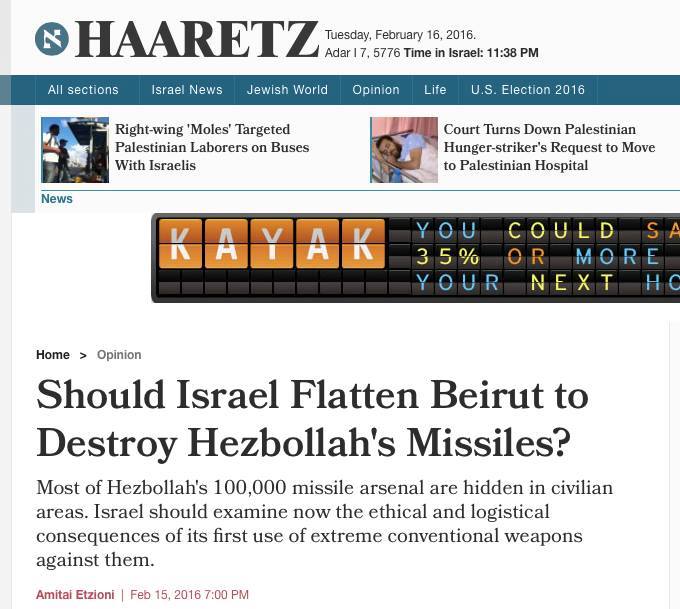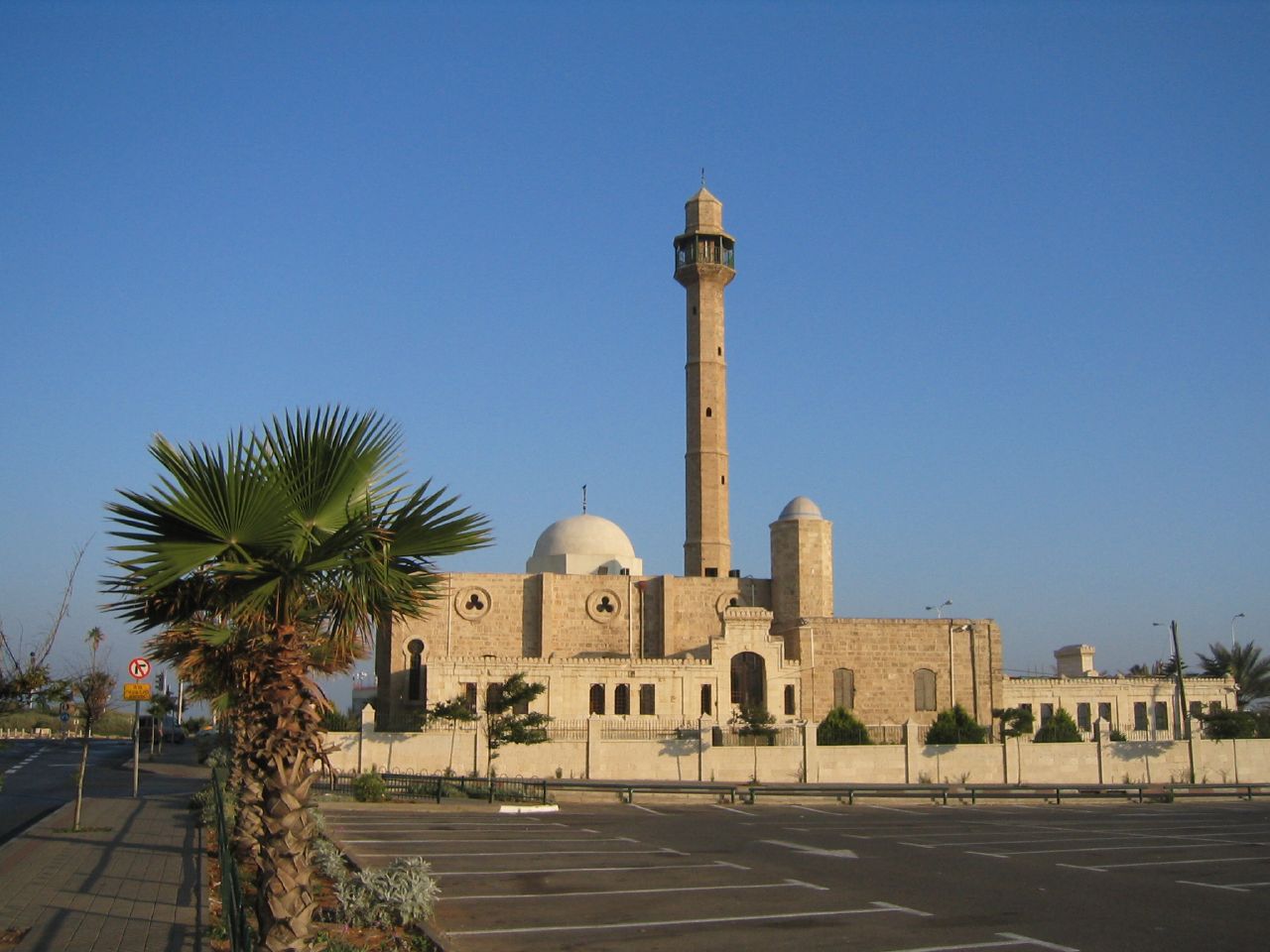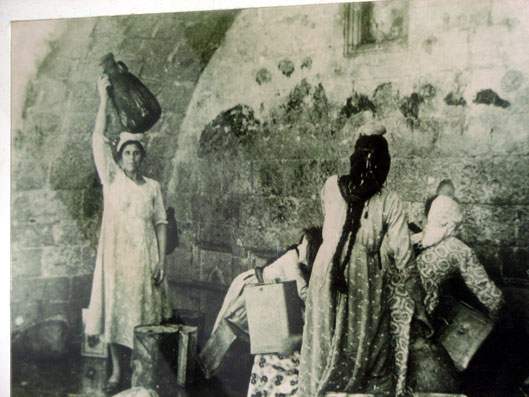
SEATTLE — (ANALYSIS) Haaretz is famed in many circles as Israel’s leading liberal newspaper. In 2011, the New Yorker’s managing editor, David Remnick, deemed it “easily the most liberal newspaper in Israel and arguably the most important liberal institution in a country that has moved inexorably to the right in the past decade.”
The newspaper is part of an Israeli journalistic dynasty founded in the 1930s by Gershom Schocken, a Jewish-German immigrant. His son, Amos, is now publisher. Remnick had these glowing things to say about Amos:
“He is … a singular force in Israeli journalism on issues such as free speech, equal rights for Israeli Arabs, the independence of the Supreme Court, and the exposure of military abuse.”
However, analysis of two recent opinion columns published by Israel’s “most important liberal institution” reveals another side to the story.
Distinguished Israeli-American academic calls for annihilation of Lebanon
Amitai Etzioni, a noted Israeli-American academic, published an alarming piece last month arguing that Israel should not endanger its own troops, who he claimed would be expected to identify and dismantle many of Hezbollah’s 100,000 rockets before they could be fired. Rather, Israel should use a devastating weapons system that would save Israeli lives while annihilating large swaths of territory in which Lebanese civilians live.
Etzioni, 87, is the University Professor at George Washington University, where he serves as director of the Institute for Communitarian Policy Studies, a think tank. The noted sociologist is best known for his advocacy of communitarianism, an academic theory which, in some ways, is a perfect distillation of Israeli attitudes toward individual rights. Etzioni argues that while such rights are important, they must be carefully calibrated so they don’t interfere with the interests of society as a whole. This is precisely the way in which the Israeli national security state persuades citizens that protecting their security is a greater good that justifies sacrificing the interests of the individual.
Etzioni’s Haaretz op-ed was originally titled, “Should Israel Flatten Beirut to Destroy Hezbollah’s Missiles?” That title has been significantly softened to tone down the genocidal content of the piece itself; it now reads: “Should Israel Consider Using Devastating Weapons Against Hezbollah Missiles?”
From this brief excerpt, perhaps you can judge for yourselves which title is more accurate and why it was changed:
“I asked two American military officers what other options Israel has. They both pointed to Fuel-Air Explosives [FAE]. These are bombs that disperse an aerosol cloud of fuel which is ignited by a detonator, producing massive explosions. The resulting rapidly expanding wave flattens all buildings within a considerable range.
Such weapons obviously would be used only after the population was given a chance to evacuate the area. Still, as we saw in Gaza, there are going to be civilian casualties.”
Etzioni vastly understates the lethality of what are otherwise known as FAEs or thermobaric weapons. The Guardian’s George Monbiot quotes a clinical description of their impact from the Marine Corps Gazette:
“Thermobaric, or ‘fuel-air’ weapons … form a cloud of volatile gases or finely powdered explosives. ‘This cloud is then ignited and the subsequent fireball sears the surrounding area while consuming the oxygen in this area. The lack of oxygen creates an enormous overpressure. … Personnel under the cloud are literally crushed to death. Outside the cloud area, the blast wave travels at some 3,000 meters per second. … As a result, a fuel-air explosive can have the effect of a tactical nuclear weapon without residual radiation. … Those personnel caught directly under the aerosol cloud will die from the flame or overpressure. For those on the periphery of the strike, the injuries can be severe. Burns, broken bones, contusions from flying debris and blindness may result. Further, the crushing injuries from the overpressure can create air embolism within blood vessels, concussions, multiple internal hemorrhages in the liver and spleen, collapsed lungs, rupture of the eardrums and displacement of the eyes from their sockets.’”
Russia used FAEs in Chechnya, and the United States employed them in Fallujah. Some experts on the laws of war have declared the use of FAEs a war crime. In 1992, Michael Ratner, founder of the Center for Constitutional Rights and one of the world’s leading legal experts on these matters, noted that FAEs violate international law:
“The use of asphyxiating gases is prohibited. The U.S. violated this by its use of fuel-air explosive bombs on Iraqi frontline troops; these bombs are terror bombs which can burn the oxygen over a surface of one or two square kilometers, destroying human life by asphyxiation.”
He further noted that FAEs are “outlawed by the Hague and Geneva Conventions, which prohibit the use of weapons causing unnecessary harm to combatants.”
It should’ve been clear to Haaretz editors that they were publishing an op-ed that not only urged Israel to commit war crimes in the next Lebanon war, but that these weapons would also open Israel to charges of genocide given the extraordinarily high death toll that would ensue.
The Israeli Defense Forces itself has developed a similar military strategy for its attacks against Hezbollah. The Dahiya Doctrine, developed by Maj. Gen. Gadi Eisenkot, who would go on to become chief of staff of the IDF, argued that Israel must wreak maximum damage on the civilian neighborhoods of Beirut in which Hezbollah was based. Such devastation would force the Islamist group to pay a maximum price for its attacks on Israel, he asserted. This is precisely what happened during the 2006 Lebanon war, when the Shiite neighborhood of Dahiya, in which Hezbollah’s leadership took refuge, was reduced to rubble. Over 1,000 Lebanese civilians were killed in that conflict.
The strategy appears to have had little deterrent effect. Hezbollah now possesses more than double the rockets it did in 2006 and poses an even fiercer threat to Israeli targets when the next war breaks out.
Etzioni’s claim that FAEs would be used only after civilians were warned to evacuate the target area is pure sophistry. Civilians in war zones have no shelter or refuge. There is nowhere they can go to escape the military onslaught. This has been proven repeatedly both in Gaza and Lebanon.
Israel makes no attempt on the battlefield to provide sites where civilians may shelter safely. It has repeatedly attacked locations such as U.N. schools, killing massive numbers of civilians. In Lebanon, it has attacked convoys of civilians fleeing combat zones and U.N. facilities where civilians have taken refuge. Faced with such a dilemma, many civilians would prefer to take their chances and remain in their homes.
Further, Israel’s attempts at “warning” civilians are feeble at best: The IDF sends targeted communities SMS messages and drops fliers from airplanes warning them to flee. How does a frightened resident whose cellphone battery has died or who is too frightened to venture out of his or her home learn about Israeli orders to flee?
The most cruel and calculating portion of Etzioni’s essay is his call for Israel to recruit pro-Israel “experts” to join war games in which they would be called upon to use these diabolical weapons:
“ … The time to raise this issue is long before Israel may be forced to use FAEs. One way this can be achieved is by inviting foreign military experts and public intellectuals, who are not known to be hostile to Israel, to participate in war games in which they would be charged with fashioning a response to massive missile attacks on Israeli high rise buildings, schools, hospitals, and air bases.
In this way, one hopes, that there be a greater understanding, if not outright acceptance, of the use of these powerful weapons, given that nothing else will do.”
This would supposedly condition the world for future Israeli use of FAEs. Etzioni is essentially calling for pre-approval of war crimes. These enablers would be offering Israel a kind of “Good Housekeeping Seal of Approval” for genocide.
Etzioni: Falsification of historical memory and Nakba denial
Amitai Etzioni has long served as a mouthpiece for the whitewashing of Israel’s moral sins. In March 2014, he wrote an op-ed in the Daily Forward in which he attempted to recount the history of the village where his family settled after fleeing Germany in 1935 and arriving in pre-state Israel:
“In 1935, as Nazi influence grew, my family escaped, joining four other families of the same background to form a new settlement in Palestine in 1936. They named it Kfar Shmaryahu (it’s next to Herzliya). The five families…cleared the rocks, drilled a water well, paved a road before erecting a bunch of modest homes and farming the land. All this was done on previously unoccupied land — land that was lying fallow next to an Arab village called Sidney Alley. …
The relationship between my parents’ village and Sidney Alley varied over the years, ranging from comfortable to tense. However, as far as I recall, no shots were fired, and most assuredly, no one was driven off land or out of a home. Those who lived unmolested in Sidney Alley until 1948 left at that point. We were told that they took with them keys to our homes that they somehow acquired, and had agreed among themselves who will get which of our homes after the seven Arab militaries that attacked the weak and newborn Israel defeated it. I never saw any evidence that supports this tale, but I know firsthand that no Israeli forces drove out the people of Sidney Alley.”
Soon after Etzioni’s account was published, Maher Mughrabi, a Palestinian-Australian foreign news editor for the Australian Age, exposed how woefully inadequate Etzioni’s account and his memory are. In a Letter to the Editor of the Forward, which he also shared with me via email, he wrote:
“Etzioni recalls the neighbouring village’s name as ‘Sidney Alley.’ This surely must strike anyone with an ear for Arab idiom as improbable. … However, if you think a bit about what this place might be called in Arabic, it turns out the mosque is of Sidna (or Sayyidna, meaning ‘our lord’) Ali. And it turns out that if you are not Etzioni, you can remember a history of displacement from this place.”

Further, the Palestinians of Sidna Ali were indeed driven from their homes not just by “shots fired” but by cold-blooded murder.
Zochrot, an Israeli NGO dedicated to memorializing Palestinian villages destroyed in the Nakba, offers a fuller account of the events leading to the tragedy of Sidna Ali. A family in the village owned a dairy and orchard on its outskirts. Their Jewish tenant invited Lehi militants to train on the farm. Someone appears to have reported this to British authorities, who then raided the farm, resulting in the killing of four Jewish militants and a commander.

To exact revenge, Lehi returned to Sidna Ali, captured five family members, lined them up against a wall and executed them. The killers deliberately permitted a few members of the family to flee so they could spread the word of the massacre among the Palestinian population. At that point, many remaining villagers saw the handwriting on the wall and fled in terror (this was in the period before the war and ensuring mass expulsions had happened). Those who did not flee were forced to flee later by menacing gunfire sprayed by Jewish forces.
You can see that one of America’s towering academic figures leaves much to be desired when recounting Israeli history. If he wrote as sloppily in his own field as he does on these subjects, he would be labelled a fraud. But instead, the pages of Israel’s leading liberal newspaper are opened wide for him to call for mass murder against Lebanese civilians.
One has to wonder how a newspaper editor decides a contribution from Etzioni about Hezbollah is even relevant. He is not a philosopher of war or ethicist like Asa Kasher or Princeton’s Michael Walzer. He is not an expert on military strategy or Israeli Defense Forces affairs. What is Etzioni’s expertise on the subject?
And even if he had expertise, how does one justify publishing an op-ed calling for genocide? It would appear that Haaretz has, in some fundamental way, gone off the rails.
Haaretz literary editor approves of rape in pursuit of artistic ‘excellence’
This becomes even more clear in the second example of a woefully misguided piece published by Haaretz. In 2013, a popular Israeli entertainer, Eyal Golan, was investigated for allegedly raping teenage girls. His father was later convicted of pimping girls to his cronies, though no charges were ever brought against Golan. In response to an Israeli TV interviewer excoriating him last month for his dissolute personal life, he responded that he made no claim to be a moral exemplar or, as he put it, “the Pope.” On the other hand, and paradoxically, he called himself a “moral man.”

On March 5, Benny Ziffer, the newspaper’s literary editor, responded to a particularly pugnacious recent Israeli TV interview with Golan by a noted female program host. Ziffer’s column launched a crusade not just to redeem Golan’s reputation, but to claim that it is the right of all artists to engage in antisocial behavior (like raping young girls) as long as they do so for their art. Further, he claims that societies which persecute such creative souls are suppressing freedom of expression and the artistic impulse (my translation is from the Hebrew piece):
“Cultured nations know that in order for art to exist and creativity to flourish, artists must enjoy moral privileges and freedoms not available to others. Even tyrants harboring no tolerance for individual freedom understand that artists must be permitted to live a Bohemian existence; and that this is part of the unwritten agreement between a society and its artists, who are offered extensive latitude under ethical norms which permit wild behavior, especially in the sexual realm.
Artists from Goethe to Eyal Golan hover intoxicatedly in the air above the heights of artistry and creativity. They must feel most intensely those things that are considered the basest sexual urges in life, like intercourse with young female admirers. Without this, there would be no creativity, despite all the pain this is liable to cause these young women, whose lives may have been damaged.”
The journalistic crime committed here is rendered even more severe by the fact that the author is neither freelancer nor columnist, but senior editorial staff.
Again, one must wonder what Ziffer’s editor was thinking when he or she approved such journalistic trash for publication. Besides the claims in this passage being pure intellectual bunkum (since when did Goethe ever justify raping young girls in order to delve deeper into his artistic impulses?), did no one at the paper stop to consider the backlash that would stem from this rape apologia?
Haaretz readers have started a petition (Hebrew) calling for the firing of Ziffer. It’s doubtful this will have any impact on Haaretz publisher Amos Schocken, whose approach to criticism is to dismiss it with hurt indignation.
I can attest to this personally. In 2012, the newspaper published an expose about Israeli museums which did not offer Arabic-language inscriptions for exhibits, as required under a law guaranteeing multi-lingual accessibility for publicly-funded cultural institutions. I wrote to the reporter, asking why Haaretz itself never published in Arabic. I argued that doing so would offer a pioneering statement from the nation’s leading liberal daily about the critical importance of embracing the Arabic-speaking Palestinian minority. I suggested, to that end, Haaretz consider publishing an Arabic-language supplement.
Instead of a response from the reporter, Schocken himself replied disdainfully that if I thought such a project was so important that I should find him funding to support it. It was a response, doubtless to say, I found disingenuous, as it wasn’t my job to secure investments in his newspaper.
The following year, Haaretz published its first article in Arabic, an editorial urging Palestinians to “get out and vote.” Ironically, many members of the Palestinian minority do not vote precisely because the institutions of the Jewish majority (like Haaretz) are largely closed to them. Generally they enjoy second or third-class rights within society, thanks in part to the patronizing approach of elite Ashkenazi Jewish institutions like it.
Haaretz refuses to publish Ziffer’s column in English edition
It should come as no surprise that Ziffer’s op-ed was not translated into English or published in the paper’s English edition. The editors there perhaps had a better understanding of their own readers and determined there was no need to inflame them. But in truth, this is a form of self-censorship. If you want to publish misogynist trash, why only publish it in Hebrew? Why not proclaim proudly to the rest of the English-speaking world what your journalistic values are?
If, as David Remnick argues, Haaretz is the best of Israeli journalism, what does that tell us about Israeli society in general and its Fourth Estate in particular? It tells us that the weight of being a garrison nation in a state of perpetual war has corroded whatever liberal values Haaretz may have once championed. It tells that no matter how much higher are the standards Haaretz upholds than those of their competitors, they are indelibly stained by historical sins of the their society.
Breaking: Managing editor cancels Ziffer’s weekly column
When reached for comment on this story, Aluf Benn, the newspaper’s managing editor, declined, but he did allude to a major forthcoming development.
Shortly thereafter, on Wednesday, Israeli business news site Globes reported than Benn had decided to cancel Ziffer’s weekly column in response to the March 5 piece.
In his final column, published on Wednesday, Ziffer apologized for what he wrote. He added, oddly, that it was all part of a twisted game he played on behalf of his audience:
“I entered into the role of provocateur [Author’s Note: literally, “playful devil”], and the game was good and yielded rewards. The audience was enthusiastic and begged for more and more columns in which I played the the game of provocateur. I reaped success. Together with the intoxication of success, this blurred within me the boundaries between the game and reality.”
Haaretz later published Ziffer’s apology in its English edition. But without the context of the original article (published only in Hebrew), readers of the English edition have no idea what “monstrosity” Ziffer is apologizing for. And that’s probably the way Haaretz’s editors prefer it. Rather than being fully transparent, it has the effect of further concealing the original offense.
Still, Ziffer remains as literary editor of the paper. He will also continue writing other articles for the paper. Presumably, Benn believes that by giving Ziffer a lower profile and “disappearing” his byline, readers — especially female readers — will be able to forget this disaster. In the past heyday of Israeli macho behavior, perhaps Haaretz could’ve gotten away with this. But can you imagine the Washington Post or New York Times in this day and age permitting its literary editor to write such swill and not firing him? The very thought seems preposterous.

